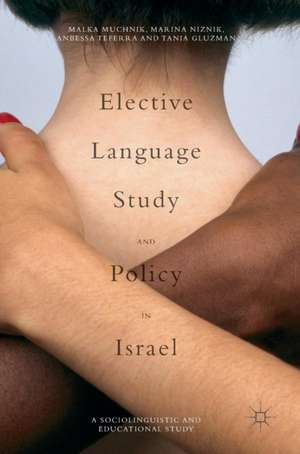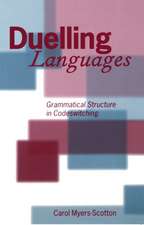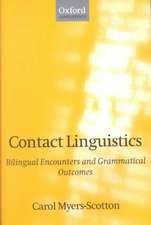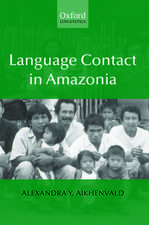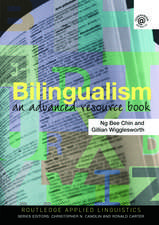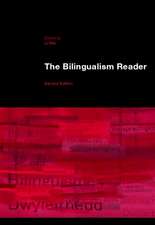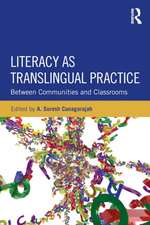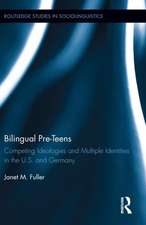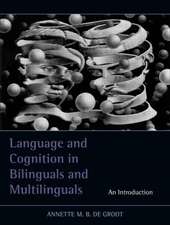Elective Language Study and Policy in Israel
Autor Malka Muchnik, Marina Niznik, Anbessa Teferra, Tania Gluzmanen Limba Engleză Hardback – 25 oct 2016
| Toate formatele și edițiile | Preț | Express |
|---|---|---|
| Paperback (1) | 382.57 lei 6-8 săpt. | |
| Springer International Publishing – 23 iun 2018 | 382.57 lei 6-8 săpt. | |
| Hardback (1) | 387.96 lei 6-8 săpt. | |
| Springer International Publishing – 25 oct 2016 | 387.96 lei 6-8 săpt. |
Preț: 387.96 lei
Nou
Puncte Express: 582
Preț estimativ în valută:
74.25€ • 77.23$ • 61.29£
74.25€ • 77.23$ • 61.29£
Carte tipărită la comandă
Livrare economică 12-26 aprilie
Preluare comenzi: 021 569.72.76
Specificații
ISBN-13: 9783319340357
ISBN-10: 3319340352
Pagini: 214
Ilustrații: XVI, 218 p.
Dimensiuni: 148 x 210 x 18 mm
Greutate: 0.41 kg
Ediția:1st ed. 2016
Editura: Springer International Publishing
Colecția Palgrave Macmillan
Locul publicării:Cham, Switzerland
ISBN-10: 3319340352
Pagini: 214
Ilustrații: XVI, 218 p.
Dimensiuni: 148 x 210 x 18 mm
Greutate: 0.41 kg
Ediția:1st ed. 2016
Editura: Springer International Publishing
Colecția Palgrave Macmillan
Locul publicării:Cham, Switzerland
Cuprins
Chapter 1: Introduction.- Chapter 2: The Status of the Four Languages in Israel.- Chapter 3: Teaching the Four Languages in Israel.- Chapter 4: The Present Research.- Chapter 5: Quantitative Results.- Chapter 6: Teaching Materials.- Chapter 7: Interviews with Students and Teachers.- Chapter 8 – Summary.
Notă biografică
Malka Muchnik is a Professor in the Hebrew and Semitic Languages Department at Bar-Ilan University, Israel. She is founder of Israel Studies in Language and Society and author of Language, Culture and Society (Hebrew) and The Gender Challenge of Hebrew.
Marina Niznik is Instructor of Russian at the School of Foreign Languages and Russian Literature at Tel Aviv University, Israel. She was head of an international team for writing textbooks of Russian and researches the acculturation of Russian immigrants in Israel.
Anbessa Teferra is Senior Lecturer at Tel Aviv University, Israel. He teaches Amharic and other Ethiopian languages, as well as the cultural space of Ethiopia. Since 2002 he is chief supervisor for Amharic instruction in the Israeli educational system.
Tania Gluzman is Instructor of French at the Foreign Languages Division and teaches French didactics at the School of Education, both at Tel Aviv University, Israel. She also was a national trainer of French instructors for the Israeli Ministry of Education.
Textul de pe ultima copertă
This book presents research on the instruction of two heritage languages and two foreign languages in Israeli schools. The authors explore language policy and the way languages are studied from the point of view of students, teachers, schools and curricula. Language in Israel is a loaded concept, closely linked to ideological, political, and social issues. The profound changes in language policy in the West along with two large waves of immigration from the Former Soviet Union and Ethiopia resulted in new attitudes towards immigrant languages and cultures in Israel. Are these new attitudes strong enough to change the language policy in the future? What do students and teachers think about the language instruction at school? Are the teaching materials updated and do they address modern demands? This book provides answers to these and other questions. As well as describing the instruction of two heritage languages, Russian and Amharic, and two foreign languages, French and Spanish,the book also contains an extensive background on the immigration history and acculturation process of the speakers of each of these languages. An in-depth understanding of the case of Israel will serve as a guide for other countries contending with similar issues pertaining to the adjustment of language policies in light of immigration and other challenging circumstances.
Malka Muchnik is a Professor in the Hebrew and Semitic Languages Department at Bar-Ilan University, Israel. She is founder of Israel Studies in Language and Society and author of Language, Culture and Society (Hebrew) and The Gender Challenge of Hebrew.
Marina Niznik is Instructor of Russian at the School of Foreign Languages and Russian Literature at Tel Aviv University, Israel. She was head of an international team for writing textbooks of Russian and researches the acculturation of Russian immigrants in Israel.
Anbessa Teferra is Senior Lecturer at Tel Aviv University, Israel. He teaches Amharic and other Ethiopian languages, as well as the cultural space of Ethiopia. Since 2002 he is chief supervisor for Amharic instruction in the Israeli educational system.
Tania Gluzman is Instructor of French at the Foreign Languages Division and teaches French didactics at the School of Education, both at Tel Aviv University, Israel. She also was a national trainer of French instructors for the Israeli Ministry of Education.
Caracteristici
Draws on both quantitative and qualitative methodologies to provide a deeper understanding of language policy implementation in Israel Addresses the instruction of the most studied elective languages in secondary schools in Israel; Russian, Amharic, Spanish and French Contains an extensive background on the immigration history and acculturation process of the speakers of each of the four languages
